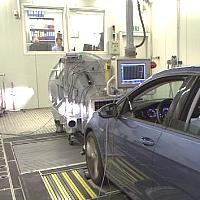(BRUSSELS) – The EU Commission opened an investigation Tuesday into whether BMW, Daimler and VW colluded to avoid competing on the development of technology to clean the emissions of petrol and diesel cars.
“The Commission is investigating whether BMW, Daimler and VW agreed not to compete against each other on the development and roll-out of important systems to reduce harmful emissions from petrol and diesel passenger cars,” said Competition Commissioner Margrethe Vestager: “These technologies aim at making passenger cars less damaging to the environment. If proven, this collusion may have denied consumers the opportunity to buy less polluting cars, despite the technology being available to the manufacturers.”
The Commission carried out inspections in October last year at the premises of BMW, Daimler, Volkswagen and Audi in Germany as part of its initial inquiries into possible collusion between car manufacturers on the technological development of passenger cars.
The Commission’s in-depth investigation is to focus on information they say indicates that BMW, Daimler, Volkswagen, Audi and Porsche – also called the “circle of five” – participated in meetings where they discussed inter alia the development and deployment of technologies to limit harmful car exhaust emissions.
In particular, the Commission says it is assessing whether the companies colluded to limit the development and roll-out of certain emissions control systems for cars sold in the European Economic Area, namely:
- selective catalytic reduction (‘SCR’) systems to reduce harmful nitrogen oxides emissions from passenger cars with diesel engines; and
- ‘Otto’ particulate filters (‘OPF’) to reduce harmful particulate matter emissions from passenger cars with petrol engines.
The in-depth investigation will aim to establish whether the conduct of BMW, Daimler and VW may have violated EU antitrust rules that prohibit cartels and restrictive business practices, including agreements to limit or control technical development (Article 101 of the Treaty on the Functioning of the European Union).
At this stage, the Commission says it has no indications that the parties coordinated with each other in relation to the use of illegal defeat devices to cheat regulatory testing.
While the Commission says it will carry out its in-depth investigation ‘as a matter of priority, the opening of a formal investigation does not prejudge its outcome.
The Commission has carried out a series of major investigations into cartels in the automotive parts sector. It has previously fined suppliers of automotive bearings, wire harnesses in cars, flexible foam used (inter alia) in car seats, parking heaters in cars and trucks, alternators and starters, air conditioning and engine cooling systems, lighting systems, occupant safety systems, braking systems and spark plugs.
Further information on the investigation will be available on the Commission’s competition website, in the public case register under the case number AT.40178 Car Emissions.



